5 Fire Hazards You Need to Know
National Fire Prevention Month traces its origins back to 1925 when President Calvin Coolidge designated October as Fire Prevention Week. This annual weeklong event was established in response to the devastating Great Chicago Fire of 1871.
In the United States, most home fires occur during the winter months as people strive to keep warm. Although in Phoenix, staying warm isn't the primary concern, the region still faces its share of conditions conducive to residential fires. Total Inspections diligently assesses potential fire hazards 363 days a year, aiming to educate homeowners about these risks and encourage preventative measures. Presented here are five common fire hazards in Metro Phoenix.
Dryers: The National Fire Protection Association (NFPA) reveals an alarming average of 15,970 fires annually attributed to dryers and washing machines, with dryers causing a staggering 92% of these fires. Electric dryers pose a higher risk due to increased heat discharge leading to lint buildup. The majority of dryer fires stem from two sources: dryer venting and the lint trap. Shockingly, over one-third of these fires could be prevented with regular cleaning and maintenance.
Aluminum Wiring: Commonly utilized in home branch circuits during the 1960s and 1970s, aluminum wiring is less efficient in conducting electricity compared to copper. This inefficiency causes the wire to heat up and expand as it carries electricity, leading to loose electrical connections over time. Loose connections may result in dangerous arcing and fires. Homes with aluminum wiring predating 1972 are a striking 55 times more likely to catch fire, as per a study by the Franklin Research Institute.
Fireplaces/Chimneys: Wood-burning fireplaces have been prohibited in new construction homes in Arizona since 1999. However, older wood-burning fireplaces, at a minimum of 24 years old, can accumulate creosote buildup within the chimney after decades of use without proper cleaning. Regular maintenance and professional cleaning can effectively mitigate the risk of chimney fires caused by igniting built-up creosote.
Improper Electrical Modifications: Maintaining proper junctions is crucial for electrical system safety. Unprofessional modifications can create circumstances conducive to electrical arcing, serving as a heat source in a significant proportion of home fires (63%) involving electrical failures or malfunctions during 2015-2019.
Natural Christmas Trees: Although Christmas tree fires are infrequent, they are considerably more lethal when they do occur. On average, one out of every 32 reported home Christmas tree fires results in a fatality, compared to one death per 143 reported home fires on average.
To enhance safety and minimize casualties during a fire, the most effective measure is to ensure operational smoke detectors. All smoke detectors have a service life of just 10 years, necessitating replacement beyond this period. Smoke detectors have been mandated in all bedrooms only since 1993; hence, additional smoke detectors in sleeping areas are recommended for homes lacking them. Different technologies exist within smoke detectors, primarily Ionization and Photoelectric types. Photoelectric detectors are particularly effective in detecting the smoke component of a fire, which is critical as smoldering fires, while less common, are responsible for a significant majority of injuries and fatalities. We advocate the installation of photoelectric smoke detectors in bedrooms and hallways.
At Total Inspections, our mission is to educate home buyers comprehensively about every aspect of a home, encompassing safety hazards and maintenance requirements, all while maintaining a positive and engaging approach. We are dedicated to more than just providing a defect list; we deliver a detailed inspection report. Whether you're in the process of buying, selling, or residing in a home, we are always ready to answer your inquiries. For more information, visit www.totalinspectionsaz.com or reach out to us at 602.369.3329.


